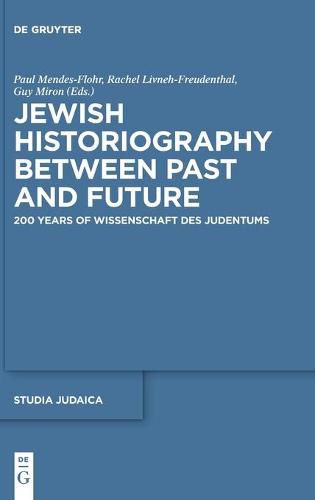Readings Newsletter
Become a Readings Member to make your shopping experience even easier.
Sign in or sign up for free!
You’re not far away from qualifying for FREE standard shipping within Australia
You’ve qualified for FREE standard shipping within Australia
The cart is loading…






This title is printed to order. This book may have been self-published. If so, we cannot guarantee the quality of the content. In the main most books will have gone through the editing process however some may not. We therefore suggest that you be aware of this before ordering this book. If in doubt check either the author or publisher’s details as we are unable to accept any returns unless they are faulty. Please contact us if you have any questions.
From its modest beginnings in 1818 Berlin, Wissenschaft des Judentums has burgeoned into a scholarly discipline pursued by a vast cadre of scholars. Now constituting a global community, these scholars continue to draw their inspiration from the determined pioneers of Wissenschaft des Judentums in nineteenth and twentieth Germany. Beyond setting the highest standards of philological and historiographical research, German Wissenschaft des Judentums had a seminal role in creating modern Jewish discourse in which cultural memory supplemented traditional Jewish learning. The secular character of modern Jewish Studies, initially pursued largely in German and subsequently in other vernacular languages (e.g. French, Dutch, Italian, modern Hebrew, Russian), greatly facilitated an exchange with non-Jewish scholars, and thereby encouraging mutual understanding and respect.
The present volume is based on papers delivered at a conference, sponsored by the Leo Baeck Institute in Jerusalem, by scholars from North American, Europe, and Israel. The papers and attendant deliberations explored ramified historical and methodological issues. Taken as a whole, the volume represents a tribute to the two hundred year legacy of Wissenschaft des Judentums and its singular contribution to not only modern Jewish self-understand but also to the unfolding of humanistic cultural discourse.
$9.00 standard shipping within Australia
FREE standard shipping within Australia for orders over $100.00
Express & International shipping calculated at checkout
This title is printed to order. This book may have been self-published. If so, we cannot guarantee the quality of the content. In the main most books will have gone through the editing process however some may not. We therefore suggest that you be aware of this before ordering this book. If in doubt check either the author or publisher’s details as we are unable to accept any returns unless they are faulty. Please contact us if you have any questions.
From its modest beginnings in 1818 Berlin, Wissenschaft des Judentums has burgeoned into a scholarly discipline pursued by a vast cadre of scholars. Now constituting a global community, these scholars continue to draw their inspiration from the determined pioneers of Wissenschaft des Judentums in nineteenth and twentieth Germany. Beyond setting the highest standards of philological and historiographical research, German Wissenschaft des Judentums had a seminal role in creating modern Jewish discourse in which cultural memory supplemented traditional Jewish learning. The secular character of modern Jewish Studies, initially pursued largely in German and subsequently in other vernacular languages (e.g. French, Dutch, Italian, modern Hebrew, Russian), greatly facilitated an exchange with non-Jewish scholars, and thereby encouraging mutual understanding and respect.
The present volume is based on papers delivered at a conference, sponsored by the Leo Baeck Institute in Jerusalem, by scholars from North American, Europe, and Israel. The papers and attendant deliberations explored ramified historical and methodological issues. Taken as a whole, the volume represents a tribute to the two hundred year legacy of Wissenschaft des Judentums and its singular contribution to not only modern Jewish self-understand but also to the unfolding of humanistic cultural discourse.